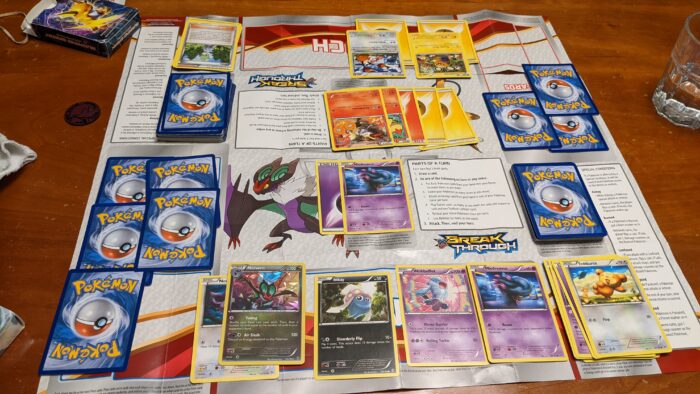
Pokémon is among the top few most popular collectible card games (CCGs) in the world.
Collectible card games are ever-expanding collections of cards where players normally buy whatever the game calls a starter pack–a pre-made deck that’s ready to play right out of the box–and have the option of buying booster packs beyond that. Booster packs are handfuls of randomized cards for the game that cost far less than starter packs, but you don’t know what you’re going to get in them, so it’s always a risk of getting more of what you already have offset by the chance to get something new that you could make good use of in the game.
Trading can be a large part of the CCG collecting experience, finding a friend or other player who may be willing to swap one of something you need for something you have extras of (or don’t want but) that they need. All of which culminates in the ability, when you’ve got enough cards on hand, to start building your own customized deck that suits your tastes and playing style. New sets of cards are released by the publisher with new creatures or characters with new abilities, enticing players to buy and trade more to broaden their collection to open up better options for their decks.
Pokémon brings players into a world where colourful, off-beat, dangerous creatures live. The creatures are powered by different kinds of magical energy that determines what category of attacks they have (fire, water, psychic, lightning, etc.) Some creature categories are particularly dangerous, or less so, against other categories, so ideally you’ll have creatures that are extra damaging to your opponent while strong against their attacks.
The players (there are only ever two at a time) are in control of the deck of creatures that are brought out to fight each other, albeit in a fun way. One active creature fights another while others stand at the ready to be brought in if and when the active monster is knocked out (removed from play). Every time one player knocks out an opponent’s active Pokémon, they pick up a “prize card”, which is one of six randomized cards from their own deck that have been put aside face down and are only ever brought into play via knocking out the opponent’s creatures.
Players win when they’ve knocked out all of the opponent’s Pokémon, when they’ve collected all of their own prize cards, or when an opponent has no deck remaining to draw from at the beginning of their turn.
The game designers added a nice twist in Pokémon in that the creatures must start off as pretty weak and without much health, but they can evolve. Bigger, heavier-hitting versions of the creatures grow from previous versions, with each of the two evolved stages making the creatures harder to knock out, pack a meaner punch, and sometimes have new abilities completely.
But as with any deck-building game, you may have a perfectly balanced deck in Pokémon where everything can jibe with everything else, but not drawing the right cards at the right time can still be disastrous. In tonight’s game we played with not only two starter decks, but two starter decks that came paired together, specifically designed to battle each other with (hence the fancy mat layout you see in the photo; it’s customized to feature these two decks playing against each other, while also showing newbies like us where specific cards are supposed to be placed as the game proceeds).
I had a pretty sizable creature that was able to take out everything my daughter brought up against it with just one attack, and I felt bad for how one-sided it seemed to be in my favour. So I held back a couple of attacks in order to give her a chance to breathe (also, of course, to let the kid actually have some fun playing a game we’ve been itching to try on and off for a couple of years now and had finally gotten around to playing), and the tide turned fast. Shortly after that, her cards finally connected a bit better and she brought out an evolved creature that started legitimately kicking my ass for a while. We finally called it a wrap because it was getting late and we still wanted to catch some Olympics (go Canada!), but as she was one prize card win ahead of me, we agreed that she won.
It speaks to the appeal and replayability of the game that we immediately agreed we’d play again soon, although maybe switching decks this time, or bringing in one of two other starter decks we have to see how they fair. We noticed that the decks we played tonight didn’t take any advantage of weaknesses or strengths of either opponent. But what if the other decks do take advantage of those? Well, that changes the gameplay quite a bit. And we both look forward to seeing how that goes.
Pokémon is a game that takes some patience to learn and you’ll be checking and re-checking rules to verify you’re doing everything right each time anything new or different comes up as you play (and with the sprawling creatures and abilities, something new and different often comes up), so it’s not a quick game to pick up and it will almost certainly tempt those who enjoy it to go get more cards to see how other creature categories work with the ones you have, or would play out against such-and-such a deck. So do be prepared to spend a bit more money than just buying a pair or two of decks to get the real feel for how the game works. But if you’re already familiar with CCGs or think you’d like to try out what one’s like, Pokémon is a solid place to start.